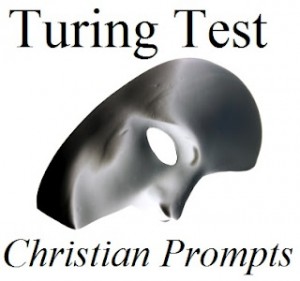This is the sixth entry in the Christian round of the 2012 Ideological Turing Test for Religion. In this round, the honest answers of Christians are mixed in with atheists’ best efforts to talk like Christians. It’s your job to see if you can spot the difference. The voting link appears at the end of the entry, and you can look at all entries in this round here.
When (if ever) have you deferred to your philosophical or theological system over your intuitions?
Occasionally I walk into a very small room, kneel down, and tell a man I’m not close with about the things I am most ashamed of. I do that because that man, acting in the person of Christ, can forgive all my sins. I also do it because afterwards I notice how I’m strengthened to do a bit better in my daily life. So cognitively I know it’s a good thing, but what I actually feel when I’m doing it is panic. This is a point on which I regularly and persistently have to override my instinct for philosophical and theological reasons.
Many of my intuitive beliefs also used to clash with the truth I found in Christianity and, more specifically, Catholicism. Examples include the usual stuff (abortion, papal infallibility, contraception…) but also things like the dignity of the body. Instinctively, I would very much have preferred owning a body over, at least in part, being one. In practice this feels less dramatic than the confession thing, because realizing a cognitive intuition is wrong already goes a far way to fixing it.
When it comes to practical morality, I’m lucky I didn’t need to do much deferring. Mostly my moral intuitions were transformed before I had opportunities to act on the old ones. Not that that stops me from making excuses, but that’s a different question.
Are there people whose opinions on morality you trust more than your own? How do you recognize them? How is trusting them different than trusting someone’s opinion on physics?
It depends on the meaning of “trust.”
I can obey an authority where my conscience would think the choice is morally neutral. But as the world catechism correctly explains, it is always immoral to violate one’s own conscience. So ultimately morality is a personal thing I can’t outsource to anyone. This is an obvious difference to physics, where I can and do outsource most of my opinions to the actual experts.
On the other hand, my conscience can err and I’m responsible to form it on the moral truth. And there can be people who are more likely to be right on (some) moral questions than I am. It could be as simple as a friend having more distance or experience than me. Of course it could also be the magisterium.
If I differ from someone more likely to be right than me, I need to find out why they disagree with me. Probably one of us understands something the other one doesn’t.
Whenever I did this with the moral teachings of the Church, I consistently found them to be wiser than both me and the world. This experience is actually one of my best reasons for being a Catholic.
Can you name any works of art (interpreted pretty broadly: books, music, plays, poetry, mathematical proofs, etc) which really capture the way you see life/fill you with a sense of awe and wonder? You can give a short explanation or just list a few pieces.
I like Walter Miller’s A Canticle for Leibowitz, because it shows things about the human condition that can’t really be told.
Something is fundamentally wrong with both people and the whole world. Old sins seem to repeat as if automatically, leaving the individual helpless. And it’s not just because of some external cartoon evil. Everyone is seeking some good and getting – sometimes subtly – corrupted in elevating it beyond the good.
But there is hope transcending this dynamic. That hope isn’t at all “pragmatic”. It values loyalty over happiness. It looks up to the image of Christ where instinctive pride would look down to its appearance. It is both terrifying and attractive.
That drama plays out in all of us and, as is advisable for us, Canticle makes it bearable by taking it lightly. Things like the “most succinct confession” are funny, because they are as absurd as our existence.
I suppose I should also recommend something more high-brow. For another (not actually Christian) take on how our existence is absurd you might try Kafka’s short story The Great Wall of China. And if you want to invest a lot more work and investigate the psychology of different responses to our condition, you should read Dostoevsky’s The Brothers Karamazov.
Click here to judge this entry, and, once you’ve voted, feel free to speculate and trade theories in the comments or look at other entries in this round.












